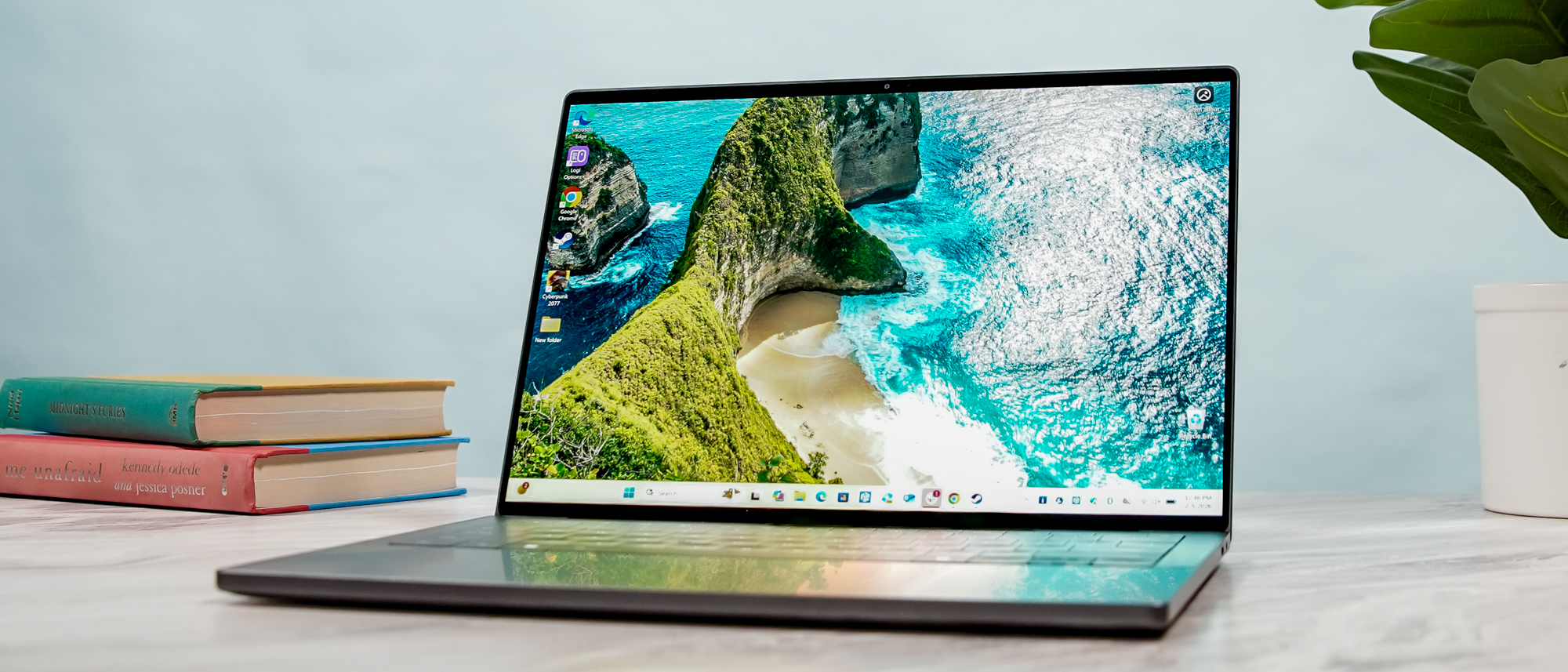Nokia Lumia 1020 vs. Galaxy S4 Zoom: Shoot-Off!
We pit Nokia's Lumia 1020 against the Samsung Galaxy S4 to see which phone is the best camera phone around. This was a really close fight.
Here at Tom’s Guide our expert editors are committed to bringing you the best news, reviews and guides to help you stay informed and ahead of the curve!
You are now subscribed
Your newsletter sign-up was successful
Want to add more newsletters?

Daily (Mon-Sun)
Tom's Guide Daily
Sign up to get the latest updates on all of your favorite content! From cutting-edge tech news and the hottest streaming buzz to unbeatable deals on the best products and in-depth reviews, we’ve got you covered.

Weekly on Thursday
Tom's AI Guide
Be AI savvy with your weekly newsletter summing up all the biggest AI news you need to know. Plus, analysis from our AI editor and tips on how to use the latest AI tools!

Weekly on Friday
Tom's iGuide
Unlock the vast world of Apple news straight to your inbox. With coverage on everything from exciting product launches to essential software updates, this is your go-to source for the latest updates on all the best Apple content.

Weekly on Monday
Tom's Streaming Guide
Our weekly newsletter is expertly crafted to immerse you in the world of streaming. Stay updated on the latest releases and our top recommendations across your favorite streaming platforms.
Join the club
Get full access to premium articles, exclusive features and a growing list of member rewards.
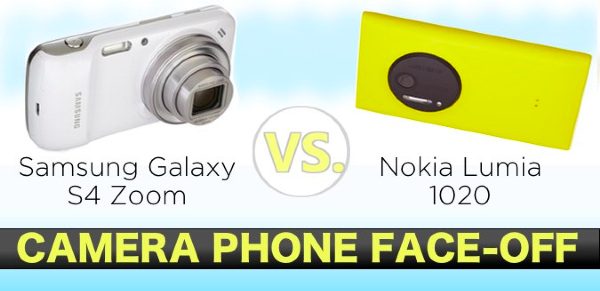
There are smartphones with cameras - like the HTC One and iPhone - and then there are cameras with smartphones. The Samsung Galaxy S4 Zoom and Nokia Lumia 1020 each fall into the latter category. These handsets sport some of the best, highest-quality cameras you'll find on any phone and easily beat the images captured by typical point-and-shoot cameras.
But just as the S4 Zoom and Lumia 1020 differ from the rest of the smartphone market, so too do they differ from each other. The S4 Zoom is a variant of Samsung's best-selling Galaxy S4, but includes a smaller 4.3-inch display attached to a 16-megapixel camera with a 10x optical zoom. The Lumia 1020 is a Windows Phone 8 device with a 4.7-inch and a 41-megapixel shooter connected to a 6x optical zoom.
Only one of these smartphones can be crowned the best camera phone on the planet. Which one will it be?
Design

The Samsung Galaxy S4 Zoom, though a derivative of the standard Galaxy S4, is wildly different in terms of both size and weight than its sibling. Measuring 4.9 x 2.5 x 1.06 inches and weighing in at a whopping 7.3 ounces, the Galaxy S4 Zoom is massive for a smartphone as a result of its enormous 10x optical zoom lens. Beyond its size, the S4 Zoom has a polycarbonate (read: plastic) chassis shaped more like a point-and-shoot camera than a smartphone, right down to the bulbous grip on its right side. Users will also face a dilemma in how to place the Zoom down. Lay it on the display, and you risk scratching the screen: put it down on the lens, and you could mark up the plastic lens cover.
Nokia's Lumia 1020 is far sexier than the utilitarian S4 Zoom. Sporting a more traditional smartphone design, the Lumia 1020 measures a relatively pocket-friendly 5.1 x 2.8 x 0.41 inches and weighs a comparatively scant 5.6 ounces. Nokia wisely chose to offer users an optional camera grip for the 1020 rather than including a built-in grip that would otherwise increase the phone's bulk, like Samsung did with the Zoom. On the flip side, the Lumia 1020 requires an optional camera grip to mount the phone on a tripod. The Galaxy S4 Zoom, on the other hand, has a tripod mount built into its body.
Winner: Nokia Lumia 1020
The Lumia 1020 may carry the same basic design as the rest of Nokia's Lumia line, but that makes it far more attractive and easier to carry in your pocket than the bulky Galaxy S4 Zoom.
Get instant access to breaking news, the hottest reviews, great deals and helpful tips.
Display
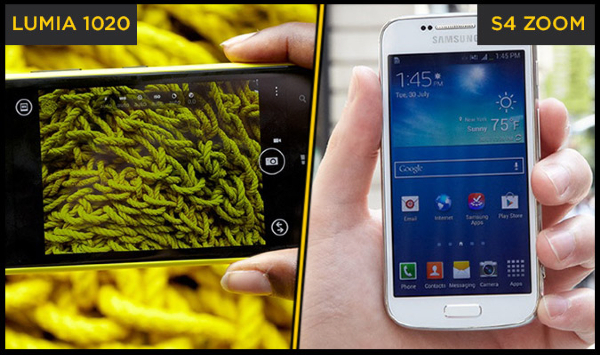
Unlike the standard Galaxy S4, which includes a 5-inch and 1080p display, the S4 Zoom comes with a 4.3-inch 960 x 540 qHD Super AMOLED screen. But don't let the Zoom's smaller size and lower resolution fool you. This handset's screen produces colors so vibrant that it easily outclasses its larger sibling. The S4 Zoom and standard S4 share similar brightness ratings of 463 lux and 460 lux, respectively, but the S4 Zoom's smaller display means you get less content on screen at once.
The Nokia Lumia 1020 sports a bright, colorful, 4.5-inch and 1280 x 768 AMOLED PureMotion display. Images looked spectacular on the 1020's screen during our tests, as did video. The Nokia's display did, however, prove slightly dimmer than the S4 Zoom, measuring 441 lux to the Samsung's 463. Blacks on the Lumia were endlessly deep and bright whites were blinding. When placed next to the Galaxy S4 Zoom, however, the Lumia's display looked slightly oversaturated.
Winner: Samsung Galaxy S4 Zoom
While the Nokia Lumia 1020 may have a larger, higher-resolution display, the Galaxy S4 Zoom has the Lumia beat when it comes to color saturation. Images were just slightly more vibrant on the Zoom than on the Lumia, giving the Samsung the win in this category.
Interface
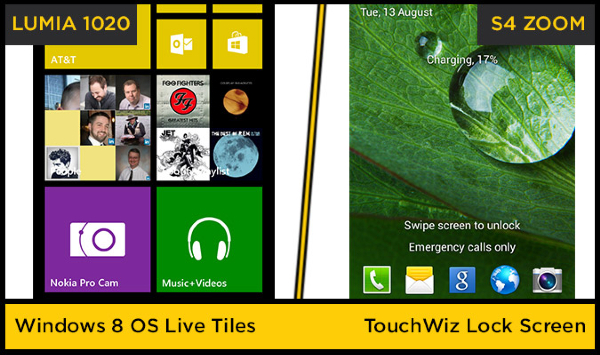
We've been fans of Samsung's latest TouchWiz interface since it debuted with the Galaxy S4 back in April. Riding on Android Jelly Bean 4.2.2, TouchWiz features a variety of helpful options and settings that improve the overall user experience. Up to 16 quick settings are available from the notification drawer, which, while overwhelming at first, prove incredibly useful over time.
The Zoom's lock screen, in particular, is exceptionally useful, allowing users to unlock up to five different apps including Camera, Phone, Messaging, Google Now and Internet. Multitasking capabilities provided by the Multi View function allow you to see two apps at the same time on one screen. There are, of course, some notable drawbacks to Samsung's UI, including the overabundance of settings and options, which can bog down the handset's performance.
Nokia's Lumia 1020 features Microsoft's Windows Phone 8 OS. This fun and easy-to-use interface sports Microsoft's ubiquitous Live Tiles-based Start screen, which provides users with updates from social media and news sites at a glance. You can also resize tiles depending on how often you use them, as well as pin and unpin apps to the Start screen. Of course, Windows Phone 8 suffers from one serious deficiency, its lack of apps. The operating system has been out for the better part of a year, but it still lacks many of today's most popular apps including Instagram, Vine and Flipboard.
Winner: Samsung Galaxy S4 Zoom
Though Windows Phone 8 has a slick interface, its lack of apps sinks it right out of the gate. The Galaxy S4 Zoom may have too many options that can overwhelm new users, but at least you can get the apps you want.
Camera Features
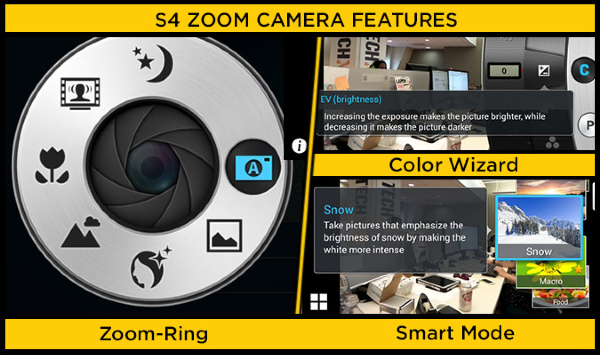
Samsung has bestowed the Galaxy S4 Zoom with enough camera settings and options to keep you busy for quite some time. Users can access the Camera app by holding down the dedicated camera button, tapping the Camera app shortcut or twisting the Zoom-ring. From the Zoom-ring users can select up to six camera-mode shortcuts including Animated Photo, Automatic, Beauty Face, Landscape, Macro and Night. You can also access the photo gallery from the Zoom-ring. Pop into the Camera app and you can select from various modes, including Auto, Expert, My Mode and Smart. Auto, as its name implies, selects the best shooting mode for your particular situation.
Meanwhile, Expert mode gives users the ability to control more advanced camera settings including Color Wizard, Program and Manual. Color Wizard lets you change the camera's various color settings, while Program lets you control the shutter speed and aperture. Manual mode gives you the option to control the camera's shutter speed, aperture, ISO, white balance and metering. You can also set how many images you capture at once.
With My Mode, you can edit the various pre-sets provided in the Zoom-ring, while Smart Mode gives you access to the camera's 25 pre-sets including Snow, Dawn, Landscape, Food, Party/Indoor, Action Freeze, Rich Tone, Panorama and more. The Camera app also lets you zoom in using the Zoom's 10x zoom lens, set the number of megapixels you want to use for a photo and switch between the back and front cameras or to video mode.
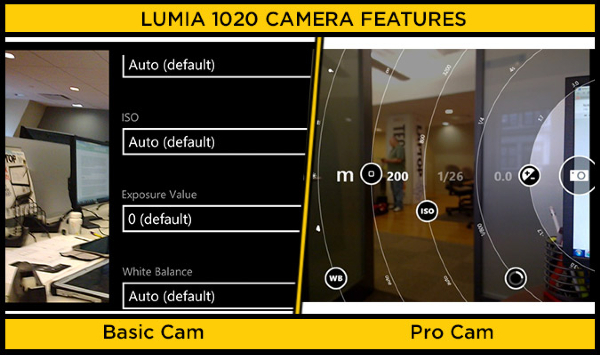
Nokia loaded the Lumia 1020 with three separate camera apps: Pro Cam, Smart Cam and the basic Camera function. From the Pro Cam app, users can swipe in from the right to bring up controls for the camera's manual focus, ISO, shutter speed and white balance. What's more, users can adjust each of these settings on the fly and see how they will affect the image in real-time. We also appreciate the in-depth tutorial Nokia provides that explains how each of the camera settings will change your image. However, we would have liked it if Nokia hadn't buried the tutorial so deeply in the app. As with the Galaxy S4 Zoom, users can also switch between the front camera and rear camera or enter video mode from the Camera app.
The basic Camera app, gives users a cursory look at what the Lumia 1020's camera can do. You can switch between the front and rear cameras, switch to video mode and change the flash settings. Users can also adjust the camera's aspect ratio, exposure value, focus assist light, ISO and white balance. There's one difference between the way you change the settings in the basic Camera app and the Pro Cam app: the basic Camera app doesn't give you a real-time preview of what these changes will do to your photo.
In addition to Pro Cam and the basic Camera apps, the Lumia 1020 includes Nokia's Smart Cam. Using this app, users tap the screen to capture a series of images. You can then swipe from left to right to choose your favorite image, or swipe up from the bottom to manipulate the photo using one of five effects including Best Shot, Action Shot, Motion Focus, Change Faces and Remove Moving Objects. Since you can use each of these effects in one shot, you have the creative freedom to change the way your photos look, without having to worry if you were using the correct shooting mode, as you do with the S4. For example, if you are using the S4's Beauty Face mode and take a photo, you won't be able to manipulate that image using Erase mode.
The problem with the Lumia 1020's approach is that all of these effects reside in different apps. Whereas the Galaxy S4 Zoom lets you control every aspect of the handset's camera from its Camera app, the Lumia 1020 requires that you use one of three apps depending on what you want to do with your photo. This is at best inconvenient and at worst confusing.
Winner: Samsung Galaxy S4 Zoom
The Nokia Lumia 1020 offers a host of fun camera options, but they are buried under layers of menus. The fact that Nokia chose to split the phone's camera settings across three apps is even more burdensome. The Galaxy S4 Zoom, on the other hand, makes navigating its Camera app's settings easy and straightforward. Furthermore, the Zoom offers significantly more shooting options in one spot.
Camera Performance
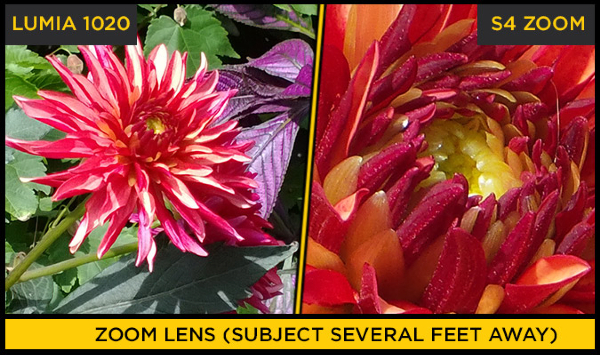
The Galaxy S4 Zoom's single best feature is its 10x optical zoom lens. With the lens fully zoomed in, we were able to take a picture of a sign for Midtown Comics from across the street without losing any detail. The lens also enabled us to take a photo of a helicopter passing overhead as it responded to a nearby fire. Backing up the Zoom's impressive lens is its 16-megapixel sensor. When we zoomed in on a bright pink-and-red flower from a several feet away, using Auto mode, we were able to see not only individual petals, but a thin spider's web running between petals, as well.
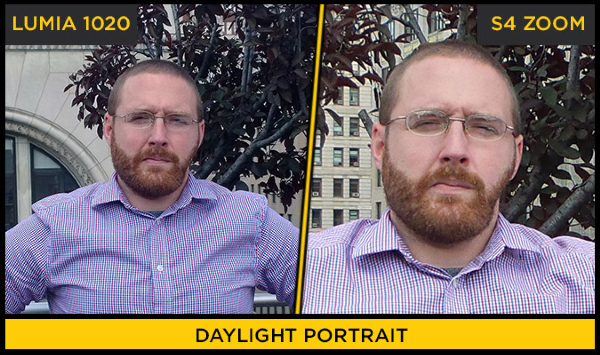
When we took a photo of a young man on the roof of Laptop's office, however, the Zoom's flaws came into full view. Fine details, such as individual hairs in the man's beard and creases in his forehead were indistinguishable. Colors were also a bit washed out, causing the sky to appear more blown out than it otherwise should have.
One other issue we noted was how long it took to shoot a photo using the Zoom. In general, we noticed a roughly 4-second delay when launching the Camera app from the Zoom-ring, tapping its shortcut or when holding down the dedicated camera button. Similarly, we saw a 2-second delay between when a photo was taken and when the camera was ready to shoot again. That may not sound like a lot of time, but it could mean the difference between capturing the perfect shot and missing it.
Nokia went all out when it comes to the Lumia 1020's ability to capture gorgeous photos. Its 6x optical zoom and 41-megapixel sensor allow users to see a heretofore unprecedented amount of detail in a photo taken using a smartphone camera. Unlike the Galaxy S4 Zoom, the Lumia 1020 was able to easily capture the minute details of our subject's face - facial hair and all. Like previous Lumia cameras, the 1020 is especially adept at capturing photos in low-light conditions.
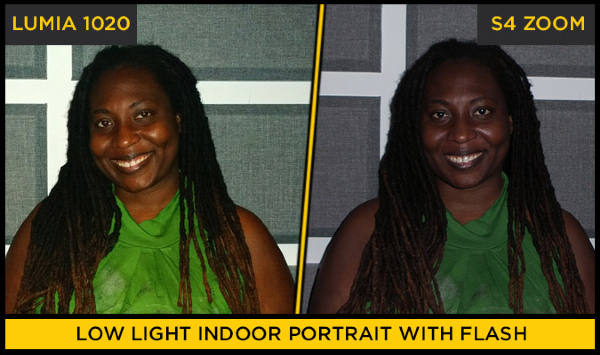
When we captured a photo of a young woman in a dimly light room with the Lumia's flash off, we were easily able to make out the details in her face and the design of her blouse. Switching on the Lumia 1020's xenon flash allowed us to uniformly light our entire subject, rather than just a portion of the scene.
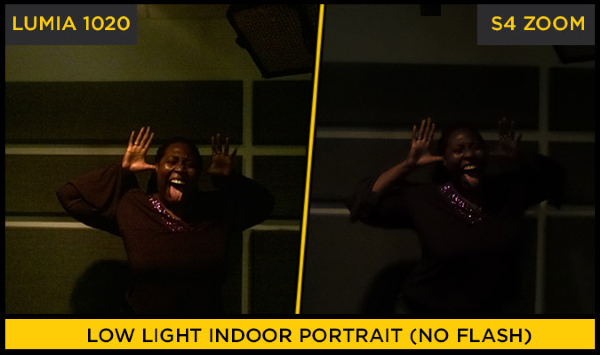
As with the S4 Zoom, however, we noted a significant delay, of 8 seconds, when taking photos with the Lumia 1020 while using the Pro Cam app in Auto mode. Times weren't much better when shooting with the basic Camera app, as we saw delays of as much as 6 seconds. Launching either app took between 3 and 4 seconds on average.
Winner: Nokia Lumia 1020
Despite the fact that the Galaxy S4 Zoom offers a larger zoom lens than does the Lumia 1020, Nokia's 41-megapixel sensor captured images with far greater detail. The Lumia's ability to capture breathtaking low-light images further demonstrates that the handset's camera is superior to the S4 Zoom's.
Specs and Performance
Samsung's Galaxy S4 Zoom packs a 1.5-GHz dual-core processor and 1.5GB of RAM, making it a significant step down from the original Galaxy S4, which included a quad-core processor and 2GB of RAM. Despite that shortfall, apps opened quickly and ran without issue, while games like "Super Monsters Ate My Condo!" suffered no visible lag. Still, the S4 Zoom fell behind the smartphone category average in a slew of benchmarks. On the Quadrant test, the S4 Zoom hit 4,499, which was roughly 1,000 points lower than the category average. When we ran the 3DMark Ice Storm Extreme test, the S4 Zoom came in with a score of 3,175, versus the category average of 4,932.
Since the Nokia Lumia 1020 runs on the Windows Phone 8 OS, we couldn't test its benchmarks against similar Android tests. Though with a 1.5-GHz dual-core Snapdragon S4 processor and 2GB of RAM, the Lumia 1020 can easily run any app you throw its way. Games like "Rayman Jungle Run," for example ran smoothly. On the Windows Phone-specific WP Bench test, the Lumia 1020 scored a 224. That's just short of the Lumia 928's score of 228, and still ahead of the Windows Phone category average of 193.
Winner: Nokia Lumia 1020
The Samsung Galaxy S4 Zoom and Nokia Lumia 1020 performed equally well during real-world scenarios, but the Zoom fell well behind its category average, as well as the scores of its closest competitors. The Lumia 1020, on the other hand, was essentially even with its closest competitors and well ahead of its category average.
Battery Life
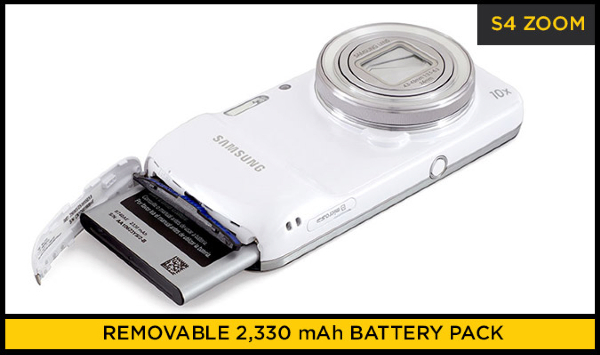
Samsung's Galaxy S4 Zoom comes equipped with a removable 2,330 mAh battery pack. That relatively small battery — the regular Galaxy S4 comes with a 2,600 mAh battery - resulted in a poor showing on our LAPTOP Battery Test, which involves continuous Web surfing over the handset's data connection with the display brightness set to 40 percent. It took just 5 hours and 9 minutes for the S4 Zoom to give up the ghost. That's roughly an hour short of the category average.
The standard Galaxy S4 lasted 6:14 minutes while running on T-Mobile's 4G LTE network. What's worse, since the S4 Zoom isn't available in the United States it was running on AT&T's HSPA+21 network, which is less power intensive than connecting over LTE. Had the Zoom been connected to the speedier network, its battery life would have been considerably lower.
Nokia packed the Lumia 1020 with a paltry 2,000 mAh battery pack. Even worse, it's not removable, which means you won't be able to replace the battery when it begins to wear out and can't hold a charge like it once did. That issue aside, the Lumia 1020 performed admirably on our LAPTOP Battery Test, lasting a solid 6 hours and 33 minutes while riding on AT&T's LTE network.
Winner: Nokia Lumia 1020
The Nokia Lumia 1020's 6 hours and 33 minutes of battery life easily outpaced not only the Galaxy S4 Zoom's time of 5:09, but also the smartphone category average of 6:07.
Overall Winner
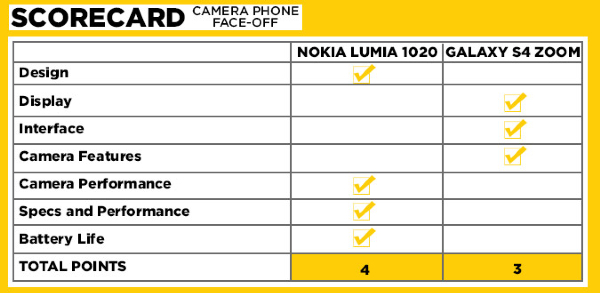
After taking four of seven rounds, the Nokia Lumia 1020 comes out on top as the best camera phone in the land. Not only is the 1020's design less obtrusive than the bulky Samsung Galaxy S4 Zoom's, but Lumia's camera performance is head and shoulders above the Zoom's, too. And with a battery that won't leave you flat when you need it, the Nokia Lumia 1020 is a winner in our book.
Follow Daniel Howley @DanielHowley and on Google+. Follow us @tomsguide, on Facebook and on Google+.
Dan Howley is a writer and editor whose work has appeared on Tom's Guide, Laptop Mag, CNN business, MSN, AOL, and more, covering smartphones, laptops, and wearables. He now works full time at Yahoo Finance, where he writes articles covering the tech and gaming industries. He lives in New York.
 Club Benefits
Club Benefits










